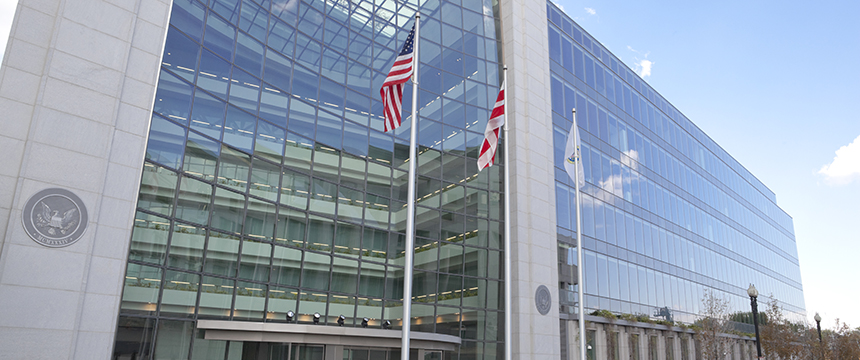Does Your Company Discourage Employees from Being Whistleblowers? The SEC May Think So!

The Dodd-Frank Wall Street Reform and Consumer Protection Act, which was enacted in 2010 in response to the 2008 financial crisis, added protections for whistleblower activity to the Securities Exchange Act of 1934 (“Exchange Act”). Specifically, Section 21F of the Exchange Act and the related Securities and Exchange Commission (SEC) rules (collectively, “Section 21F”), provide protections to employees and other persons who report possible violations of securities laws to the SEC. Section 21F created a bounty program whereby, if a whistleblower’s tip leads to an enforcement action, then, in some cases, the whistleblower can receive a percentage of the sanctions collected by the SEC. Section 21F also prohibits any action that could “impede an individual from communicating directly with the [SEC] staff about a possible securities law violation, including enforcing, or threatening to enforce, a confidentiality agreement…with respect to such communications.”[1]
SEC Enforcement Activity
The SEC has brought over 32 enforcement actions against both public and private companies for violations of Section 21F, with many actions alleging that provisions in certain agreements between the companies and their employees impeded the employees from reporting possible violations to the SEC. For example:
- In June 2022, the SEC settled with The Brink’s Company regarding the terms of its confidentiality agreements entered into as a part of the company’s onboarding process, which prohibited employees from sharing the company’s confidential information with any third party without the prior written authorization the company. The SEC found that this language violated Section 21F because it did not include a carveout that would permit confidential information to be shared with the SEC without the prior approval of the Company, which could impede an employee’s ability to report potential violations to the SEC.[2]
- In September 2023, the SEC settled with privately-held Monolith Resources LLC regarding the terms of its separation agreements with former employees that required them to “waive their rights to monetary whistleblower awards in connection with filing claims with or participating in investigations by government agencies.” These agreements explicitly stated that the agreement was not intended to in any way prevent or limit the former employee from participating in any investigation, but the SEC found that the language still impeded employees from participating in the SEC’s whistleblower program “by having employees forego important financial incentives that are intended to encourage people to communicate directly with SEC staff about possible securities law violations.”[3]
- In September 2024, the SEC settled Section 21F charges with seven public companies, including a charge against Acadia Healthcare Company Inc. over language in its employee separation agreements that required employees to represent that they had not filed any complaints or charges with any agency or court, and agree they would not file any complaints with an agency or court relating to events prior to the date of the agreement. The SEC found that this could be interpreted as preventing former employees from reporting suspected securities law violations to the SEC.[4]
An important note worth highlighting is that, in all of the above cases, the SEC did not find that any whistleblower had actually been (or even claimed to have been) deterred from making a report to the SEC by the language in question or that the company had ever tried to enforce such language – rather, the enforcement action was brought merely because the language existed.
What You Should Do Now
As evidenced by the seven settlements that the SEC entered into on a single day in September 2024, whistleblower language continues to be a focus of SEC enforcement actions. Additionally, a number of publicly-traded companies have received demand letters from shareholders requesting revisions to publicly-filed agreements that the shareholders assert violate Section 21F and seeking access to books and records to investigate whether other agreements or policies exist that would violate Section 21F.
Because of the SEC’s increased focus on whistleblower language and the rise of demand letters, all companies, but particularly public companies, should review their employment, separation, and similar agreements with employees and contractors, as well as equity incentive and severance plans and award or participation agreements, to ensure they do not contain any language that could potentially be interpreted as impeding whistleblower activity. While the SEC enforcement actions appear currently to be focused on employee agreements, we note that Section 21F applies to any person, not just employees, so companies may also wish to consider reviewing their customer, supplier, investor, and other agreements for similar problematic language.
Whether any specific language in an agreement violates Section 21F will depend on the specific scope and substance of the provision. However, a non-exhaustive list of potentially problematic provisions include those that:
- Prohibit the use of the company’s confidential information for any reason without appropriate carveouts or limitations;
- Prohibit an individual from making any potentially disparaging remarks to any third party without appropriate carveouts or limitations;
- Prohibit an individual from filing a report or complaint about the company with the SEC;
- Require an employee to provide notice (advance or otherwise) to the company before or after contacting, meeting with, or disclosing confidential information to, the SEC; or
- Require an individual to waive the individual’s right to recover a monetary award for participating in an SEC investigation relating to a securities law violation.
If you have any questions about potential problematic language in any of your existing contracts or other arrangements, or for other assistance in addressing whistleblower protections, please contact your Foley attorney or one the authors of this article.
[1] 17 CFR § 240.21F-17(a).
[2] The Brink’s Company, Securities Exchange Act Rel. No. 95138 (June 22, 2022).
[3] Monith Resources, LLC, Exchange Act Rel. No. 98322 (September 8, 2023).
[4] Acadia Healthcare Company, Inc., Exchange Act. Rel. No. 100970 (September 4, 2024).

